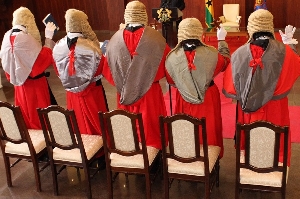HIV (Human Imuno ? deficiency Virus) is a virus that breaks down a person?s immune system. AIDS (Acquired Immune Deficiency Syndrome) is what follows when the body has become infected with HIV and the body is not able to fight off a whole range of infections and conditions it becomes prone to. There are two main ways in which HIV is passed on from one person to another. Intercourse. One is through sexual intercourse. Thus when semen or virginal fluid from an infected person enters another persons body during penetrative Sex. The other is from blood stream to blood stream. Example people who have blood transfusion when the blood is infected.
Despite evidence that prevention programs and methods instituted some time ago are beginning to impact in some countries, the HI/ AIDS pandemic continues to grow. By 2005, the number of those infected had grown to more than 40 million, double the number in 1995 (source: international AIDS candlelight Media.).
In a conference held by the Global Health council in the United states, it was obsewed that in the last decade, major advances in prevention and treatment for HIV/AIDS have prolonged and improve the lives of many, but despite this, the pandemic is far from over. The disease has indeed proved to be deadly. It was suggested at the conference that to defeat HIV and AIDS there is the need to reduce the number of people who become infected making prevention the most effective defence against HIV/AIDS. That a comprehensive approach must be used to prevent the further spread of HIV infection. Undoubtedly, it is based upon this that some people including some key personalities in Ghana have, out of frustration argued that prostitution be legalised in Ghana since it is one of the causes of the spread of the deadly disease.
PROSTITUTION IS A CRIAUNAL ACT Prostitution is a criminal act which attract criminal penalty as per the criminal books of the country. Prostitution is defined by section 279 Of the crinmal code 1960 (Act 29) as? amended by Act 554 (section 15) as ? includes the offering by a person of his body commonly for acts of lewdness (Sex) payment although there is no act of ordinary sexual connexion? section 276 of the code as amended by sect 14 of act 554, provides that ? any person who persistently solicits or importunes in any public place or in sight of any public place for the purpose of prostitution shall be liable for a first offence to a fine not exceeding ?500.000 and for a second or subsequent offences shall be guilty of a misdemeanour. Section 275 provides that any person who in any public place or in sight of any public place persistently solicits or importunes to obtain clients for any prostitute, or for any other immoral purpose shall be guilty of a misdemeanour.
ARGUEMGNI FOR LECALIZATION To the proponents of legalisation of prostitution, these provisions in our long-adored criminal code should be repealed and replaced by the provisions that every person has the right to offer his or her body in any place for acts of lewdness (Sex) for payment. And when this is done structures will be put in place to make sure that men and women or boys and girls who wish to offer their bodies for sex for payment obtain license from an approved body and these prostitute shall be subjected to periodic HIV test to make sure that none of them practise the prostitution while infected, and if a licensed prostitute becomes infected his/her license will be withdrawn.
THE QUESTION TO ASK It is however strongly submitted that a problem is not solved by creating a more deadly problem. A very important question that needs to be answered is on what basis did our lawmakers made prostitution a crime in our criminal code? One of the very main purposes of passing a criminal legislation in every legal system is the protection of. PUBLIC MORALS. This is why offences like indecent exposure, soliciting for immoral purpose (prostitution0 rape and other sexual offences are prohibited in virtually all jurisdictions. PUBLIC INTEREST AND MORALITY In the Hulsbury Laws of England, 4th edition, page 16, it has been explain that ? ??. Ordinarily, a crime is a wrong which affects the security or well ? being of the public generally so that the public has an interest in its suppression.?
Lord Patrick Devlin in his book the ?Enforcement of morals? writes; ?I think it is clear that criminal law is based on moral principle. In a number of cases its function is to enforce morality and nothing else.? Morality is that which keeps society alive. Society without morality is not worth living in. And this morality cannot be sacrificed for anything, such as AIDS which can be curbed in a more permanent way (such as abstinence). The act of offering by a person of his/ her body for acts of sex for payment (prostitution) is a social canker; it is an affront and a serious threat to morality which is the breath of our society. This is undisputable the rationale behind our long- adored criminal code in its part 4, chapter 7 prohibiting offences such as prostitution, gross inclemency, brothel and obscenity, which are against public morals. Also it is in the same interest that all the religions in Ghana speak against the act of prostitution and acts of its kind. For example the HOLY BIBLE, in Leviticus 19:29 says ?Do not degrade your daughter by making her a prostitute, or the land will turn to prostitution and be filled with wickencness. The HOLY QURAN also says similar things.
THE UNRELIABLE ARCUEMENT With regard to the argument attached to the idea of legalisation of prostitution by its proponents, that structures will be put in place to conduct test on these licensed prostitutes to ensure they operate without being infected with the virus, it is submitted that this is not reliable. It has been proved that when one is infected with the HIV, it can only be detected after a number of mouths (about 6 mouths) within which period the virus could be transmitted. This implies that the infected person can be tested and proved HIV negative and licensed while having the virus and before this prostitute can be proved positive, he/she might have infected all his/her ?customers? with the virus. More so, the effectiveness of the said HIV check to be conducted on the licensed prostitutes is questionable, in the light of their number vis- a-vis our resources. In the light of these complexities and insecure formalities, legalisation of prostitution has proved to be incapable of solving the HIV/ AIDS pandemic. The proposition is therefore unfounded.
PROSTITUTION DOING MORE HARM THAM GOOD Another critical pomt is that legalisation of prostitution stands to do more harm than good to a county like Ghana. If we legalise prostitution for most of our youth (Females and males) to enter into this business (prostitution) since it is more paying, which age group in our society do we expect to establish moral, social and economic families which form the basis of the society? Can be a wife or husband? Can a prostitute have all it takes to raise children to become humanly fit to be lived with in society?
CONCLUSION Yes! It is true that HIV/ADIS is killing us, it is shutting down our dreams and for that reason very urgent but comprehensive and permanent solutions are not only inevitable, but also desirable. But while we think of how to deal with the deadly pandemic, we should not commit an unforgivable mistake by erasing our moral code which is our very existence as a society. People should be rather suggestion how strictly we can enforce the part of our criminal code dealing with prostitution and acts of its kind for them to be completely drained out of our country, because that is the only way we are going to succeed in preventing the spread of the virus through prostitution.
Fellow good people of Ghana, let us all be watchdogs of the morals of our society lest the society becomes susceptible to unspeakable and abhorring thoughts and propositions which affects our very existence as human beings.















